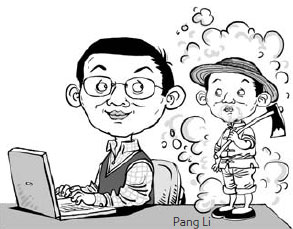
It's not every day that I think about what I would be doing if China had not undertaken the road to reform and opening up. When I do think about it, I know it's no laughing matter.
When the Third Plenary Session of the Community Party of China's 11th Central Committee passed this historic policy, I was enrolled in Hangzhou University. I was just 15, not yet of college age. I was in my third year of high school when I was plucked by the school authorities to take the college entrance exam. I did not ace it, but passed with a razor-thin margin.
Two years before that, I was destined for a life of digging earth. I was born and grew up in a small town in northern Zhejiang because my mother had been a "re-educated urban youth". The rules had been: the first born of every urban family had to be sent to the countryside for "re-education", a fancy name for farming. My mother had many friends, mostly from Shanghai, and they formed a kind of informal club because they did not really get along with the local farmers, whose life of subsistence farming they were encroaching upon. There were many horror stories, but somehow they managed to laugh about them.
I grew up loving to read and was so ill-prepared for a life of planting rice and raising silkworms that my parents seriously considered a fake divorce so that I would be able to remain in town and be assigned a job as a sales clerk. My maternal grandmother worked at a State-owned shop all her life and made 30 yuan a month. Since she did not use up all her ration coupons, we did not experience anything remotely resembling hunger. But my father's side of the family were farmers and it was a different story.
My parents hated my earning good grades in school. When I was in elementary school, they constantly reminded me of the uselessness of literacy. All the students with good grades ended up in misery and those "bad students" got assigned the better jobs, they pointed out. I was encouraged to get some real skill such as masonry or carpentry. But I was so clumsy with my hands even my handwriting was below par.
Things began to change for me in early 1978 when Deng Xiaoping reinstated the national college entrance exam. Suddenly, knowledge did not make one a pariah, but someone potentially useful. Unlike the first two years of high school, when students would wreak havoc in the classrooms and humiliate teachers, the good students now became popular. Classmates harassed me with math questions instead of stuffing my pockets full of worms. Out of the blue I was appointed class president.
Still, when the school authorities suggested I sit for the college entrance exam, no one took that seriously. I was told it was to boost my self-confidence when I graduated from high school and then really sat for the exam. Since my test scores in the sciences, the humanities and in English were about the same, I ended up applying to college as an English major. I'm not exaggerating if I say I knew less than 1,000 English words at that time.
My college education later led me to graduate studies in Guangzhou and the University of California at Berkeley in the United States, and on to opportunities and interests beyond my wildest dream. My mother dreamt that I would see Hangzhou and Shanghai during my lifetime. That was her idea of seeing the world. By 1982, my horizon had grown beyond Zhejiang province.
Had it not been for Deng Xiaoping's vision in 1978, I would be holding a hoe now, instead of a computer mouse.
|
|
|
|
|
|
|
|
